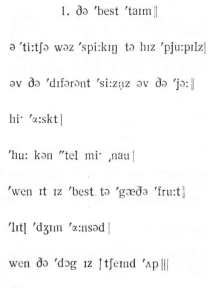PECULIARITIES OF REDUCTION IN ENGLISH
In certain positions such structural/functional words as prepositions, auxiliary and modal verbs may be used in their strong forms even when thev are unstressed.
1. Prepositions have their strong forms at the very end of a sentence/syntagm:
Ex.: Who is she talking to? [ hu: Iz Si' tLkiN tu: ]
2. Prepositions may have both strong and weak forms when they are
followed by an unstressed personal pronoun at the end of a
sentence/ syntagms. NB: You 'd better stick to one tendency only.
Ex.: She was not listening to them, [Si wqz nPt lIsniN tu: (tq) Dqm]
3. Polysyllabic prepositions followed by a pronoun at the end of a phrase are usually stressed: Ex.: Have a look under it. [ hxv q lVk Andqr It ]
4. Auxiliary and modal verbs and the link-verb "to be" have their strong forms at the end of a sentence or a syntagms:
Ex.: What is hanging on the wall? — Pictures are. [ wPt Iz hxNiN Pn Dq wLl ] — [ pIktSqz a:]
5.Auxiliary and modal verbs have their strong forms at the beginning of general and alternative questions in careful speech:
Ex.: Can you get it now? [ kxn ju get it naV ]
6.The following structural words are NEVER REDUCED, so they
possess strong forms onlv:
which [ wItS ] when [ wen ] then [ Den] on [Pn], in [In]
what [ wPt ] where [wFq ] how [ haV ] with [ wID]
"some": meaning "certain"= [sAm]; meaning "quantity"= [sqm]; Compare: There's some milk in the bottle. [ DFqz sqm mIlk in Dq bPtl ] Some people don't like milk. [sAm pi:pl dqVnt laIk mIlk]
"that" = demonstrative pronoun [Dxt]; conjunction [Dqt] Compare: I know that. [ aI nqV Dxt] (demonstrative pronoun)
I know that he's here [aI nqV Dqt hIz hIq ] (conjunction)
7. The verb "to have" as a notional verb has NO WEAK FORMS even if it
is unstressed:
Ex.: He has an elder sister. [ hI hxz qn eldq sIstq ]
8. The strong forms of auxiliary and modal verbs, personal and possessive
pronouns and form-words are used when they are said in isolation, being
marked by the logical stress, thus becoming the communicative centers of
an utterance:
Ex.: I'm speaking of YOU, not ME. [aIm spi:kiN qv ju: | nPt mi:].





